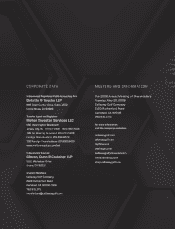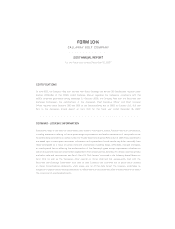Callaway 2007 Annual Report Download - page 19
Download and view the complete annual report
Please find page 19 of the 2007 Callaway annual report below. You can navigate through the pages in the report by either clicking on the pages listed below, or by using the keyword search tool below to find specific information within the annual report.Advertising and Promotion
Within the United States, the Company has focused its advertising efforts mainly on a combination of
printed advertisements in national magazines, such as Golf Magazine,Sports Illustrated and Golf Digest, and
television commercials, primarily on The Golf Channel and on network television during golf telecasts, as well
as web-based advertising. Advertising of the Company’s products outside of the United States is generally
handled by the Company’s subsidiaries and is consistent with U.S. strategies.
In addition, the Company establishes relationships with professional golfers in order to promote the
Company’s products. The Company has entered into endorsement arrangements with members of the various
professional golf tours to promote the Company’s golf club and golf ball products. For certain risks associated
with such endorsements, see below, “Certain Factors Affecting Callaway Golf Company” contained in Item 1A.
Competition
The golf club markets in which the Company competes are highly competitive, and are served by a number
of well-established and well-financed companies with recognized brand names, as well as new companies with
popular products. With respect to drivers, fairway woods and irons, the Company’s major competitors are
TaylorMade, Titleist, Cobra, Cleveland (Srixon), Ping, Mizuno, Bridgestone, MacGregor and Nike. For putters,
the Company’s major competitors are Ping, Titleist and TaylorMade. In addition, the Company also competes
with Dunlop, Bridgestone and PRGR among others in Japan and throughout Asia. The Company believes that it
is the leader, or one of the leaders, in every golf club market in which it competes.
The golf ball business is also highly competitive. There are a number of well-established and well-financed
competitors, including Acushnet (Titleist and Pinnacle brands), Sumitomo Rubber Industries (Dunlop and Srixon
brands), Bridgestone (Bridgestone and Precept brands), Nike, TaylorMade (MaxFli brand) and others. These
competitors compete for market share in the golf ball business, with Acushnet having a market share of over 50%
of the golf ball business in the United States. The Company’s golf ball products have been well received by both
professional and amateur golfers alike. The Company’s golf ball products continue to receive a significant degree
of usage on the major professional golf tours and maintained the number two position on the PGA tour in 2007.
In addition, the Company’s golf ball products remained number two in U.S. dollar market share in 2007.
For both golf clubs and golf balls, the Company generally competes on the basis of technology, quality,
performance, customer service and price. In order to gauge the effectiveness of the Company’s response to such
factors, its management receives and evaluates Company-generated market research for U.S. and foreign
markets, as well as periodic public and customized market research for U.S. markets from Golf Datatech. For
risks relating to competition, see below, “Certain Factors Affecting Callaway Golf Company” contained in
Item 1A.
Environmental Matters
The Company’s operations are subject to federal, state and local environmental laws and regulations that
impose limitations on the discharge of pollutants into the environment and establish standards for the handling,
generation, emission, release, discharge, treatment, storage and disposal of certain materials, substances and
wastes and the remediation of environmental contaminants (“Environmental Laws”). In the ordinary course of its
manufacturing processes, the Company uses paints, chemical solvents and other materials, and generates waste
by-products, that are subject to these Environmental Laws. In addition, in connection with the Top-Flite
Acquisition, the Company assumed certain monitoring and remediation obligations at the manufacturing facility
in Chicopee, Massachusetts.
6
























